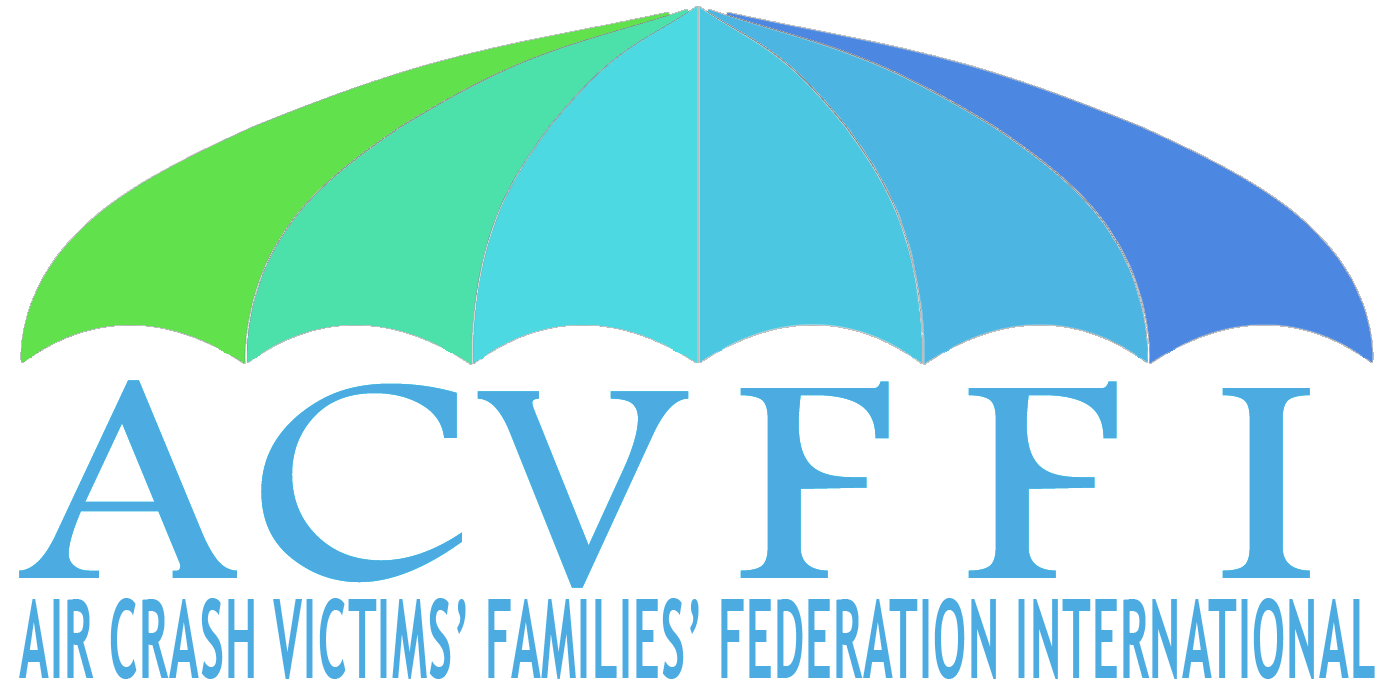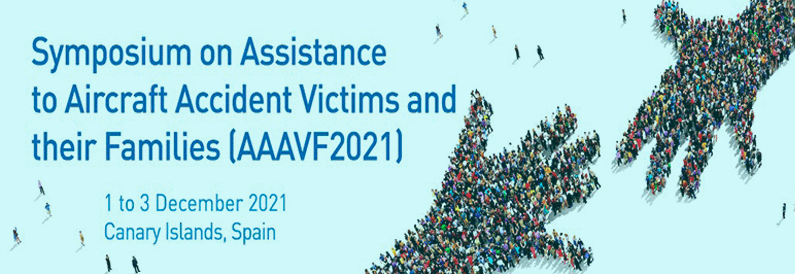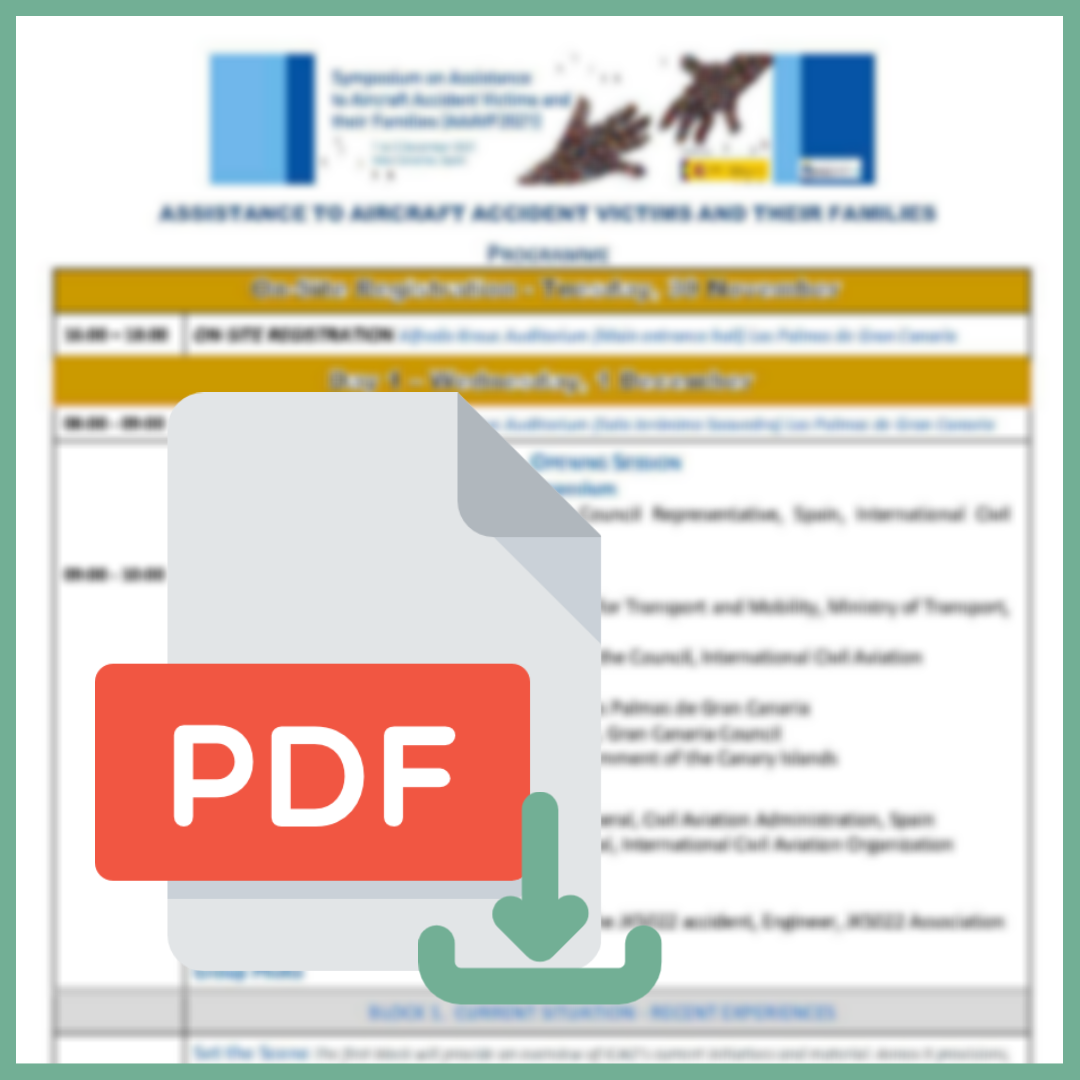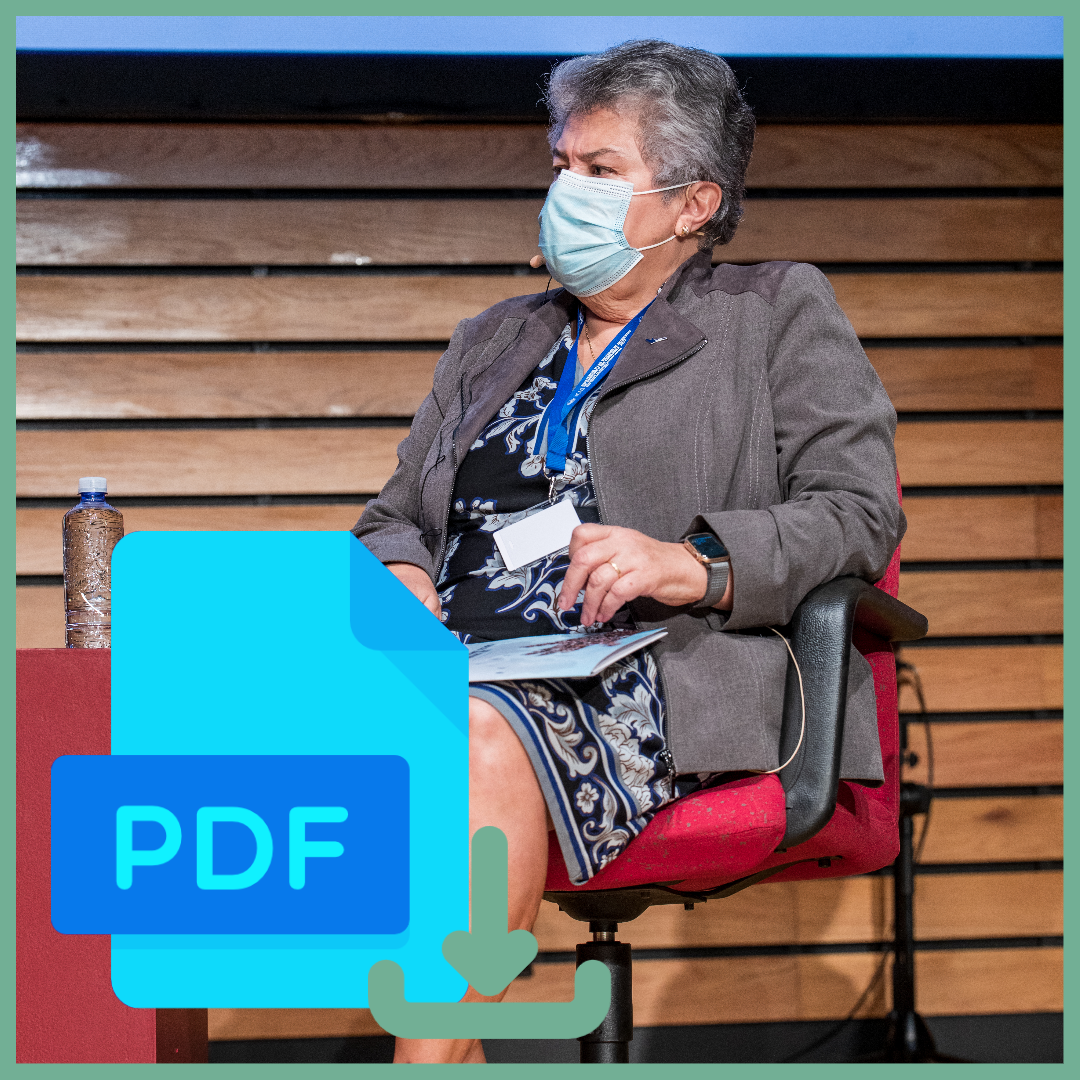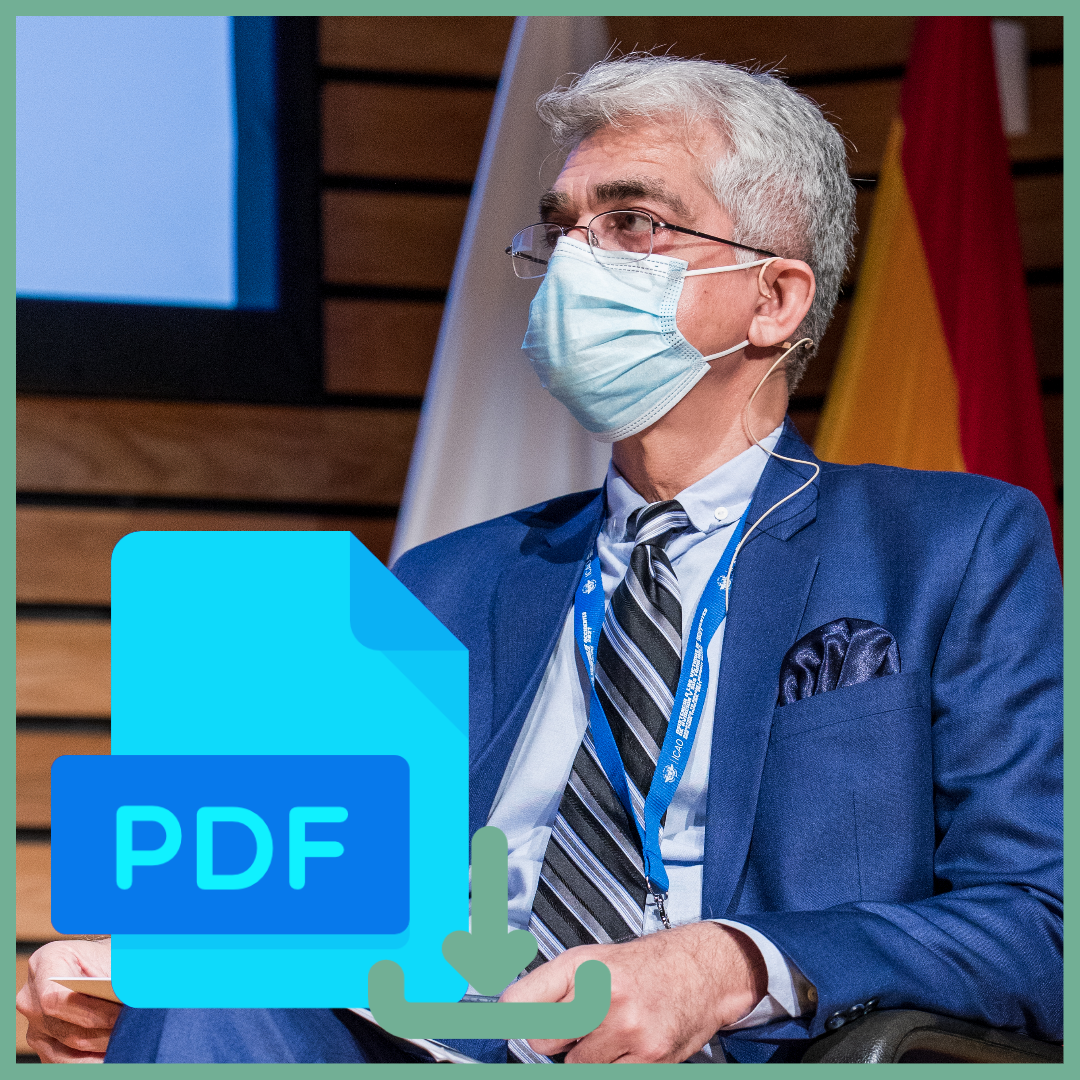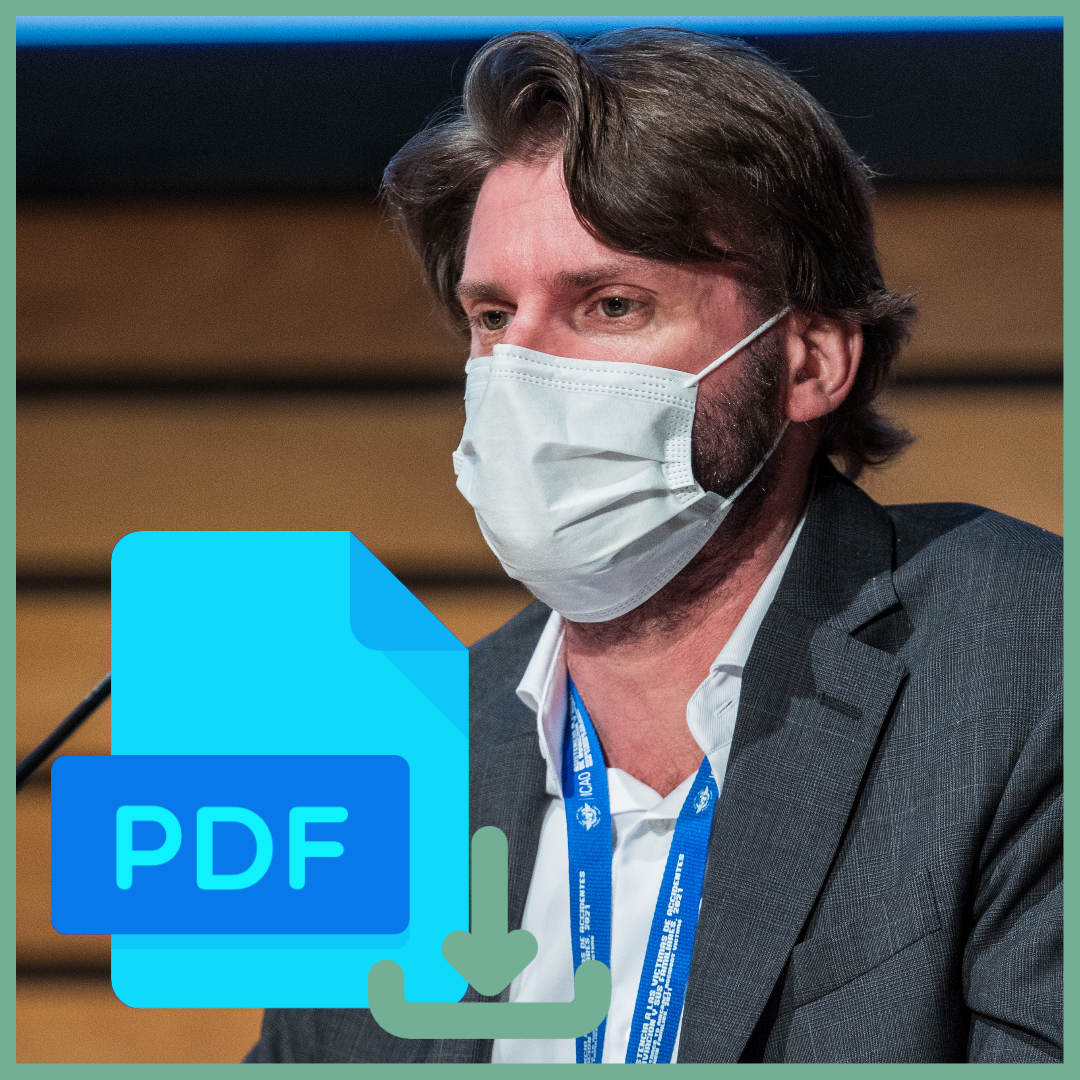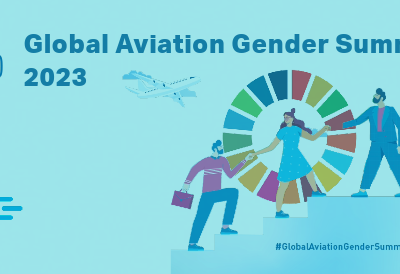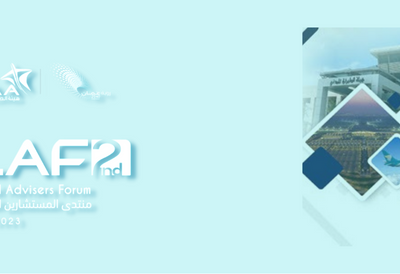Event Background
In its 76-year history, ICAO had never before organized an event dedicated to assisting victims of air accidents.
There had been two parallel experiences:
At the request of Ms. Pilar Vera, ICAO included in its triennial calendar 2019-2021 the planning of this event to discuss various issues affecting air accident victims, such as accident investigation, insurers’ practices with victims, passengers’ rights, and the handling of information by the media and investigating authorities.
It was planned for 2020, but the global pandemic COVID-19 stopped it.
Mrs. Pilar Vera, with great effort, managed to get the Government of the Canary Islands and the Spanish Ministry of Transport to cooperate so that it could be held in Las Palmas de Gran Canaria, as a tribute to the passengers of flight JK5022. In addition, Mrs. Pilar Vera requested it at the informal meeting between the ICAO Council and the ACVFFI.
First ICAO Symposium
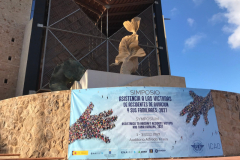 The ICAO AAAVF 2021 event was held at the prestigious Alfredo Kraus Auditorium in Las Palmas de Gran Canaria, Spain, from December 1 to 3, 2021. It was attended by more than 1,600 participants from the 193 ICAO Member States and 40 international organizations.
The ICAO AAAVF 2021 event was held at the prestigious Alfredo Kraus Auditorium in Las Palmas de Gran Canaria, Spain, from December 1 to 3, 2021. It was attended by more than 1,600 participants from the 193 ICAO Member States and 40 international organizations.
The event marked a significant milestone in the history of the global civil aviation . It was a resounding success, with delegates participating in a variety of expert panels and discussions.
The Symposium provided a unique opportunity to share information and enhance expertise for the benefit of relevant national authorities, aircraft and airport operators, insurance companies, communication media and other stakeholders.
The event aimed to provide an overview of the legal framework related to family assistance, to enhance international cooperation for successful implementation, to share experiences and best practices in the management of compensation by insurance companies, and to define the way forward for short and long term strategies.
The program for the Symposium was prepared by ICAO in cooperation with the Government of Spain and was divided into the following blocks:
- Block 1; Current Situation – Recent Experiences
- Block 2; Information Management – Lessons Learned
- Block 3; Accident Investigation Authorities – Lessons Learned
- Block 4; Insurance Best Practices
- Block 5; Identification of Short, Medium and Long Term Strategies
- Block 6; Next Steps for Victim Assistance.
Below you will find the full programme of the symposium and videos of the six sessions, which are available for free on ICAO-TV, you only need to create an account to access the content.
ACVFFI at Symposium
The ACVFFI had the honor of sending its top members to represent the organization at a recent symposium. The Chairwoman, the Secretary-General, Mr. Juniad Hamid, and Ms. Monica Macafferri, were the esteemed representatives.
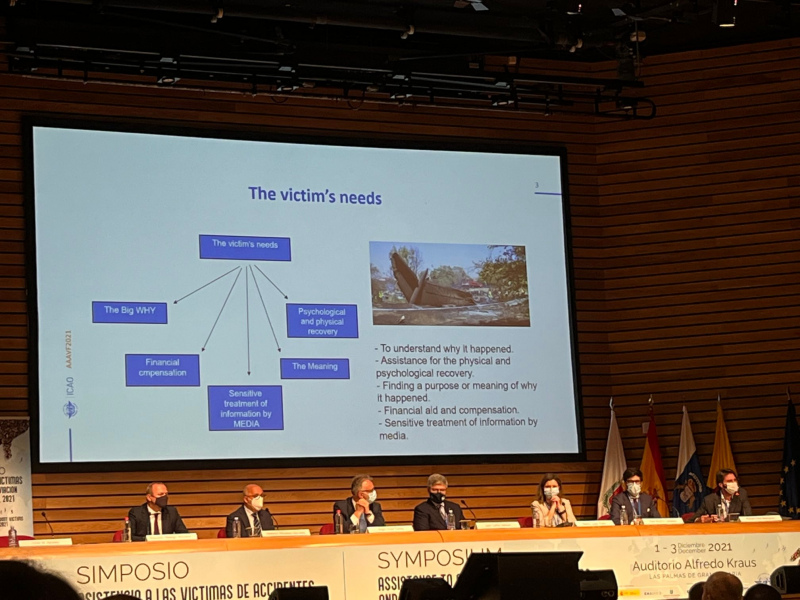
Mr. Rafael Vidal, a member of AVJK5022 and a survivor, delivered a thought-provoking keynote address that addressed pertinent issues. Ms. Pilar Vera was also a key participant in the symposium, delivering two presentations on December 1 and 3. During her sessions, attendees particularly appreciated her valuable insights into emergency management during airline disasters and her elaboration of the Symposium’s conclusions.
The ACVFFI was extremely proud to be represented at this remarkable event and looks forward to more such opportunities in the future as it continues its commitment to improving conditions for accident victims.
Mrs. Pilar Vera intervened on December 1 and 3 in two different sessions. In the first, she focused her presentation on the emergency management of an air disaster and in the second, she defined the conclusions of the symposium.
Recommendations
ICAO issued an AAAVF 2021 report and posted presentations on its website. In addition, it issued a Electronic Bulletin on April 13, 2022, listing the thirty recommendations.
- ICAO to encourage States to implement existing Annex 9 Recommended Practice 8.46, as well as ICAO Doc 9998 and Doc 9937. The participants suggested that ICAO issue a State Letter attaching the AAAVF Symposium final report, in the process requesting implementation of the report’s conclusions and recommendations;
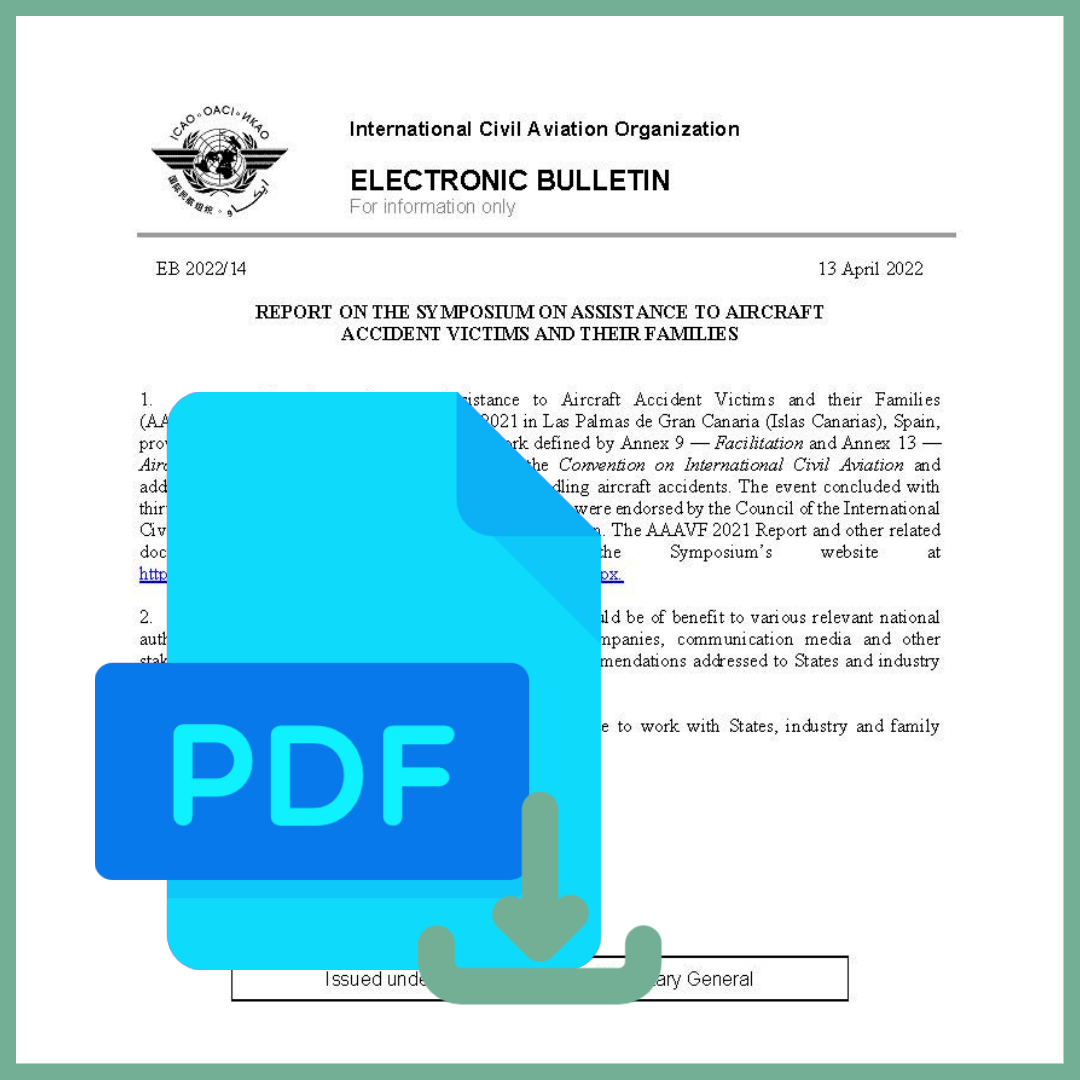
ICAO EB on AAAVF 2021 Symposium - It was also suggested for ICAO to review and update Doc 9998 and Doc 9973 building on recent experiences;
- ICAO to continue to monitor compliance of AAAVF-related SARPs via the ICAO USOAP, while additional information is gathered through the EFOD mechanism;
- ICAO Council to upgrade ICAO Recommended Practice 8.46 to an international Standard, thus in accordance with Article 37 of the Convention on International Civil Aviation (Chicago Convention) creating an obligation for States to comply with the provision, if no difference is filed. The Standard is to be audited by USOAP;
- An assessment is to be conducted considering the overarching issue of support to victims and families in all the Annexes, identifying any gaps and formulating further recommendations as required;
- ICAO should promote a combination of regulation, training and cooperation among authorities, service providers, airlines and including the ACVFFI and its associations in order to improve the implementation by States, aircraft and airport operators of the ICAO Doc 9998;
- ICAO should promote implementation of ICAO Doc 9998, the ratification of MC99 and compliance with Annex 9 SARPs. ICAO should organize regional workshops in States/Regions with special needs relying on the support of ACVFFI and its associations, as required;
- Regional offices of ICAO should play an active part in promoting the policies above and organizing the workshops relying on the support of ACVFFI and its associations, as required;
- The AAAVF function in the ICAO Secretariat should be focused and supported by an identified responsible unit;
- Wide effort is required to call upon the responsibility of communication media and agencies to treat accident information respecting the dignity of victims, families and individuals. Building on experiences of some recent tragedies beyond aviation could help. ICAO should prepare a compilation of best practices currently applied by States and agents. An assessment of those best practices may need to consider the formulation of a communication code of conduct to be shared worldwide;
- The ratification of MC99 is to be encouraged as there is no uniformity worldwide in the treatment of victims and families;
- A specific initiative is required to standardize the process to be followed by families when an accident occurs, including proper guidance that puts steps into simple language;
- The timely issuance of advance payments must become global practice. A targeted workshop is suggested to advance on the topic so as to identify further decisions to be taken. Additionally, a total level of compulsory compensation is to be reviewed in proportion to the insurance policies subscribed by aircraft operators. ICAO should organize a specific ad hoc forum to deal with compensation and facilitating procedures for survivors and families of victims;
- An ICAO group, supported by the appropriate legal expertise, should consider best practices of insurance companies and their relationship with victims and families, balancing the needs of airlines and also victims and families;
- Following the specific forum held to discuss compensation, and after having analysed the best practices of insurance companies, the community should assess whether review of MC99 and other related treaties is needed;
- The ICAO Accident Investigation Panel (AIGP) should consider proposing guidance material for accident investigators to provide focused briefing material, including “what, when and how” information to families of victims;
- The AIGP should also consider providing guidance on how to address communication media when an accident occurs and how to continue providing verified, on-time information for public release, while protecting the investigation process;
- Independence, rigor and technical capability of accident investigation authorities are fundamental prerequisites for providing value to the accident investigation findings and also, importantly, to provide credibility to the accident reports. Absence of conflict of interest is essential. Promotion by ICAO of regional cooperation will assist in improving the investigation process alleviating cases of limited technical resources and/or experience in certain States;
- Clear independence of the accident investigation authority, whose main objective is to determine the root causes of the accident and avoid its recurrence, and the judicial investigation, to conclude on potential criminal responsibilities, needs to be stressed by ICAO;
- Accident investigation Final Reports should be easily understandable for families and translated in all the languages of interest to the families;
- Transparency regarding accident investigation reports should be enhanced through an ICAO web platform, where the exchange of reports and their recommendations amongst investigation authorities and experts could be facilitated;
- ICAO should create a web platform to facilitate the exchange of information for safety investigation authorities and experts;
- ICAO should support State’s capacity building, including through the recently developed training course related to assistance to aircraft accident victims and their families and based on Doc 9998 and Doc 9973, to help States establish foundational knowledge. In delivering the course ICAO should cooperate with the ACVFFI to provide additional factual experience and credibility;
- IATA is encouraged to make use of the ICAO Doc 9998 and incorporate AAAVF into their plans. While ICAO audits States in the compliance of SARPs, IATA is invited to integrate the monitoring of airlines plans through its IOSA audit program;
- IATA is invited to integrate the assistance to victims and families into the work of its expert group on Emergency Planning and to consider the participation of ACVFFI in this group;
- ACI, considering the importance of the airports of departure and arrival and those located close to the site of the accident in facilitating the arrangements following an air catastrophe, is invited to include the auditing, monitoring and accrediting of plans for support to victims and families in its accreditation programmes of their members;
- ICAO should enhance cooperation between ICAO, IATA, ACI and CANSO, and other interested organizations, including through the development of multi-branded guidance documents;
- The report of the first AAAVF Symposium, including conclusions and recommendations, should be posted on the ICAO website and also be published in paper format so as to extend the lessons learned and to serve as a basis for future similar events in other States;
- States, and associations such as IATA and ACI, are invited to collaborate with ACVFFI before, during and after an aircraft accident occurs, making use of previous experiences; and
- It is recommended that the AAAVF Symposium be given continuity in the future with similarlyarranged symposia, to be organized on a biannual or triannual basis to fit within the ICAO Assembly cycle. ICAO should inform the Assembly of the outcomes of these events.
